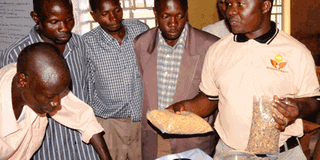Coffee village established in Kibaale

An agri-business expert showing processed coffee beans to members of farmers’ groups in Kibaale District. Experts say the current coffee law is missing aspects that can safeguard quality. FILE PHOTO
What you need to know:
Uganda is one of biggest exporters of coffee in Africa but also has a high youth unemployment rate. The initiative aims at addressing that.
Arrangements have been finalised to help communities to boost coffee farming in the move to enhance the fight against poverty.
The initiative in Bwanswa Sub-county in Kibaale District is spearheaded by a Makerere University professor, Samuel Kyamanywa, who seeks to engage 100 youth in planting 500 coffee trees.
The project seeks to raise production returns of 180 tonnes of graded coffee valued at between Shs900m and Shs1.1b when exported by 2020.
“Uganda is facing high unemployment among the youth and in order to avert the situation, we need to revive coffee farming as a tool to boost job opportunities,” he said while addressing members of Bulegete, Mikole and Kyawanyana groups during a training on coffee value chain.
Equip with skills
A technical team from Consortium to enhance University Responsiveness to Agribusiness Development (Curad) and National Union of Coffee Agribusiness and Farm Enterprises (Nucafe) trained the youths to equip them with modern farming skills.
If handled successfully, Prof. Kyamanywa says, the project would help them with a source of livelihood.
He attributed the declining coffee rates to the outbreak of coffee wilt disease, a problem that was compounded by a breakdown in the coffee marketing infrastructure. Kibaale was among the most affected areas.
“The coffee village established here at Bwanswa sub-county will hopefully be propagated elsewhere in the country, the farming village with serve as a centre of excellence serving purposes of research to the advantage of those seeking to revive modern coffee farming,” he adds.
Joseph Nkandu, Curad founding director, says the village would benefit coffee farming through use of the Farmer Ownership Model.
It would facilitate marketing to enable ownership of the crop through different modes of value addition systems up to the level of graded, roasted and ground coffee.
“The system will also include putting in place mechanisms of planting disease-resistant high-yielding breeds, quality controls, bulking centre, identifying processing facilities and establishing marketing channels between the association and the target buyers,” he said.
Though Uganda is one of the leading coffee exporters in Africa with local consumption of output at less than 2 per cent.
But in May this year, Uganda emerged as the biggest exporter of coffee in Africa, at 1.6 million bags, followed by Ethiopia, which exported 1.4 million bags.




